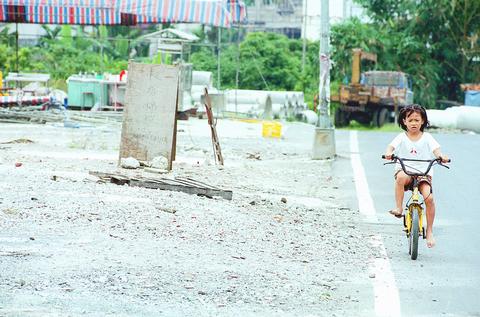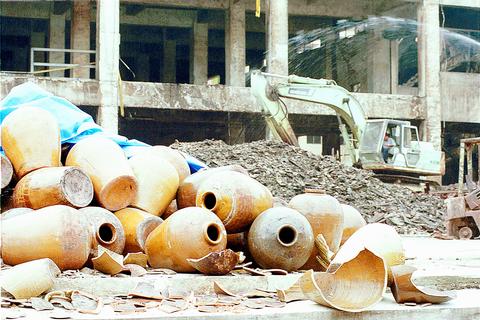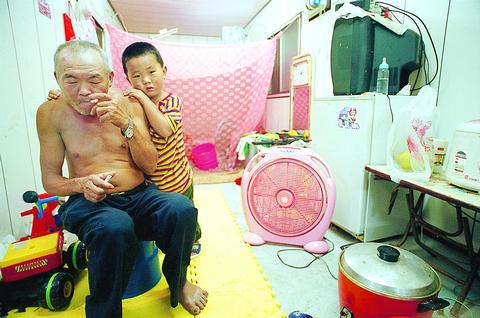One year after the 921 earthquake, tackling quake-related crimes remains a major task for Taiwan's legal system.
A recent indictment came on Tuesday, when 10 builders and architects involved in the construction of a multi-story residential complex that collapsed and killed 28 people in Tungshih (東勢), Taichung County, were charged with manslaughter and forgery. Tungshih was one of the areas worst-hit by the earthquake.
This is at least the 32nd indictment in this type of case, and the number of people indicted has risen to around 160, according to data from the Ministry of Justice and district prosecutors' offices. Few cases have reached a court ruling, however.

PHOTO: CHEN CHENG-CHANG, TAIPEI TIMES
Faulty building construction that resulted in deaths and damage is just one kind of quake-related crime being targeted by the judiciary. Others include embezzlement of post-quake relief or reconstruction funds and goods, and bid rigging in public reconstruction projects.
The progress of building collapse cases has been widely criticized as being too slow, and victims are still waiting to receive compensation from construction firms. A lawyer who volunteered to assist victims in Taipei City's Tunghsing Building (東星大樓) case, in which 89 died, attributed much of the delay to the complicated process of authenticating the causes of each collapse.
Shoddy building

PHOTO: CHEN CHENG-CHANG, TAIPEI TIMES
In the Tunghsing case, the prosecutor had commissioned the Taipei City Professional Civil Engineers Association (台北市土木技師公會) to carry out an authentication and accordingly five contractors and architects were indicted last November. "But further authentication demanded by the accused is still going on," said lawyer Justin Hsieh (謝政達).
Hsieh said that a major difficulty for Tunghsing's authentication is that the apartment complex was built 17 years ago -- when construction codes and decrees were not yet well developed.
"The lack of definite regulations might leave room for the construction firms to argue that they did not violate the law," Hsieh said.

PHOTO: CHEN CHENG-CHANG, TAIPEI TIMES:
Related information is also hard to gather in such cases.
He said in two other cases where the destroyed buildings were only five or six years old, such as the Doctors' Home (博士的家) complex in Hsinchuang (新莊), Taipei County, the legal process has gone more quickly and smoothly than that of Tunghsing.
Another major problem with the Tunghsing case, Hsieh said, is that of the five people indicted, one, a construction firm boss Hsieh Lung-sheng (謝隆盛), has became a vegetable after suffering a stroke some time prior to the quake, and two others are abroad, not willing to attend court hearings.
The Taipei District Court ordered the provisional seizure of the construction firms' real estate, valued at some NT$300 million, but no convictions or final settlement has been made for the Tunghsing case.
"A conviction will bring justice, but now the most important thing for the victims may be for them to reach a settlement and get compensation," Hsieh said.
He could not predict, however, when a settlement might be reached.
While a number of large apartment complexes collapsed in the 921 quake, the Doctors' Home case is one of only a few cases in which judgements have been reached and convictions made. A settlement is reportedly expected in a few days. But the court ruling has still prompted debate.
The Doctors' Home case is an example of "license leasing" -- a practice with a long history and prevalent in Taiwan's construction industry.
In license leasing, the construction company which undertakes to build a building does not really conduct the work itself. Instead, it leases its license to companies that are not necessarily qualified to do the work required for the project. It is these companies and subcontractors that actually carry out the construction work and for this reason, construction is often substandard.
In the Doctors' Home case, Panchiao (板橋) District Prosecutor Chen Ming-hsiang (陳銘祥) indicted for manslaughter not only the real builders of the collapsed block, but also officials of the company which had leased out its license.
Chen said at the time that the company possessing the license should also be held responsible for the shoddy construction and thus the deaths of the victims.
But the Taipei district court later ruled on June 12 that officials of the company were guilty of forgery but not guilty of manslaughter. The court convicted five builders and subcontractors of manslaughter.
The court said there was no evidence indicating obvious causation between license-leasing and poor quality of a building -- a conclusion with which lawyer Jhering Cheng (鄭文龍) does not agree.
"Of course there is a causal link between these two things. The companies leasing out licenses are able to assess that the companies without licenses are not capable of building houses of good quality. If they do not lease out licenses, these flawed buildings would not be built," Cheng said.
Public safety will not be secured if people who lease out licenses are not held responsible [for the casualties]," Cheng said.
He also said that the Taipei Bar Association (台北律師公會) is to hold a conference at the end of this month to discuss related issues.
Corruption
To the many who were deeply impressed and moved by the solidarity Taiwan society showed after the quake, the idea that government officials would take advantage of the unprecedented tragedy to embezzle relief and reconstruction funds intended for quake victims has come as a shock.
But this has happened.
Wu Chao-feng (
Chen Kuo-hsiung (
Lin Wen-sheng (
Chen Tsang-nan (
These cases are the most high profile ones and similar cases are not rare. Divisional head prosecutor at Nantou District Prosecutors' Office, Hsu Sung-kuei (
"This is a chronic disease of society. Perhaps because in the past too few [offenders of corruption] have been caught, now, that which is wrong has been practiced for so long that it has come to be regarded as right and commonplace by many public officials," Hsu said.
However, Hsu said, a major problem that has encouraged people like Wu Chao-feng to embezzle is the government's inefficiency in dealing with the relief.
"One year on, so much of the relief funds have not reached quake victims. This is evidence that the government's administrative operation is still in chaos.
"A lack of good management of relief funds and goods leaves opportunities for misappropriation to those who have access to these resources," Hsu said.
Gangsters
After the destruction wreaked by the quake there were numerous reconstruction projects. These have not escaped the grip of gangsters and corrupt officials.
"The invasion of gangsters into post-quake public reconstruction in disaster areas is severe," said Chu Nan (朱楠), prosecutor-general of Taichung District Prosecutors' Office.
In one instance of bid-rigging, gangsters manipulated businessmen who were bidding on a series of mountain road reconstruction projects in Taichung County, raising the price of the projects in an attempt to get profits out of the government. Fortunately, the criminal attempt failed and 17 people have been convicted.
In reconstruction of the collapsed Shihgang Dam (石岡水壩), 20 people and nine companies were indicted for bid rigging.
A Nantou County councilor, Pan Yi-chuan (潘一全), earlier this month was arrested and charged with using threats of violence to gain public contracts.
Many reconstruction jobs were categorized as emergency projects and in such cases, public bidding was not required. This enabled gangsters to manipulate the tendering process, Chu said.
Chu and Hsu agreed that post-quake corruption and reconstruction contract rigging cases have been a heavy burden on law enforcement agencies in disaster areas and that, more importantly, this has been due to the incompetence of the administrative system.
"For example, public construction or procurement projects undergo several stages of administrative procedures. If there is any problem it should be detected while in the administrative system, before the prosecution launches a criminal investigation," Hsu said.
Five district prosecutors' offices in disaster areas have, on the justice ministry's decree, set up a cooperative mechanism between prosecution and government ethics departments within several governmental agencies to facilitate the detection of crimes.
"However, the monitoring within the administrative system must function first," Chu said, "Otherwise offenders will not be deterred."

INVESTIGATION: The case is the latest instance of a DPP figure being implicated in an espionage network accused of allegedly leaking information to Chinese intelligence Democratic Progressive Party (DPP) member Ho Jen-chieh (何仁傑) was detained and held incommunicado yesterday on suspicion of spying for China during his tenure as assistant to then-minister of foreign affairs Joseph Wu (吳釗燮). The Taipei District Prosecutors’ Office said Ho was implicated during its investigation into alleged spying activities by former Presidential Office consultant Wu Shang-yu (吳尚雨). Prosecutors said there is reason to believe Ho breached the National Security Act (國家安全法) by leaking classified Ministry of Foreign Affairs information to Chinese intelligence. Following interrogation, prosecutors petitioned the Taipei District Court to detain Ho, citing concerns over potential collusion or tampering of evidence. The

Seventy percent of middle and elementary schools now conduct English classes entirely in English, the Ministry of Education said, as it encourages schools nationwide to adopt this practice Minister of Education (MOE) Cheng Ying-yao (鄭英耀) is scheduled to present a report on the government’s bilingual education policy to the Legislative Yuan’s Education and Culture Committee today. The report would outline strategies aimed at expanding access to education, reducing regional disparities and improving talent cultivation. Implementation of bilingual education policies has varied across local governments, occasionally drawing public criticism. For example, some schools have required teachers of non-English subjects to pass English proficiency

NEGOTIATIONS: The US response to the countermeasures and plans Taiwan presented has been positive, including boosting procurement and investment, the president said Taiwan is included in the first group for trade negotiations with the US, President William Lai (賴清德) said yesterday, as he seeks to shield Taiwanese exporters from a 32 percent tariff. In Washington, US Trade Representative Jamieson Greer said in an interview on Fox News on Thursday that he would speak to his Taiwanese and Israeli counterparts yesterday about tariffs after holding a long discussion with the Vietnamese earlier. US President Donald Trump on Wednesday postponed punishing levies on multiple trade partners, including Taiwan, for three months after trillions of US dollars were wiped off global markets. He has maintained a 10 percent

TRADE: The premier pledged safeguards on ‘Made in Taiwan’ labeling, anti-dumping measures and stricter export controls to strengthen its position in trade talks Products labeled “made in Taiwan” must be genuinely made in Taiwan, Premier Cho Jung-tai (卓榮泰) said yesterday, vowing to enforce strict safeguards against “origin laundering” and initiate anti-dumping investigations to prevent China dumping its products in Taiwan. Cho made the remarks in a discussion session with representatives from industries in Kaohsiung. In response to the US government’s recent announcement of “reciprocal” tariffs on its trading partners, President William Lai (賴清德) and Cho last week began a series of consultations with industry leaders nationwide to gather feedback and address concerns. Taiwanese and US officials held a videoconference on Friday evening to discuss the